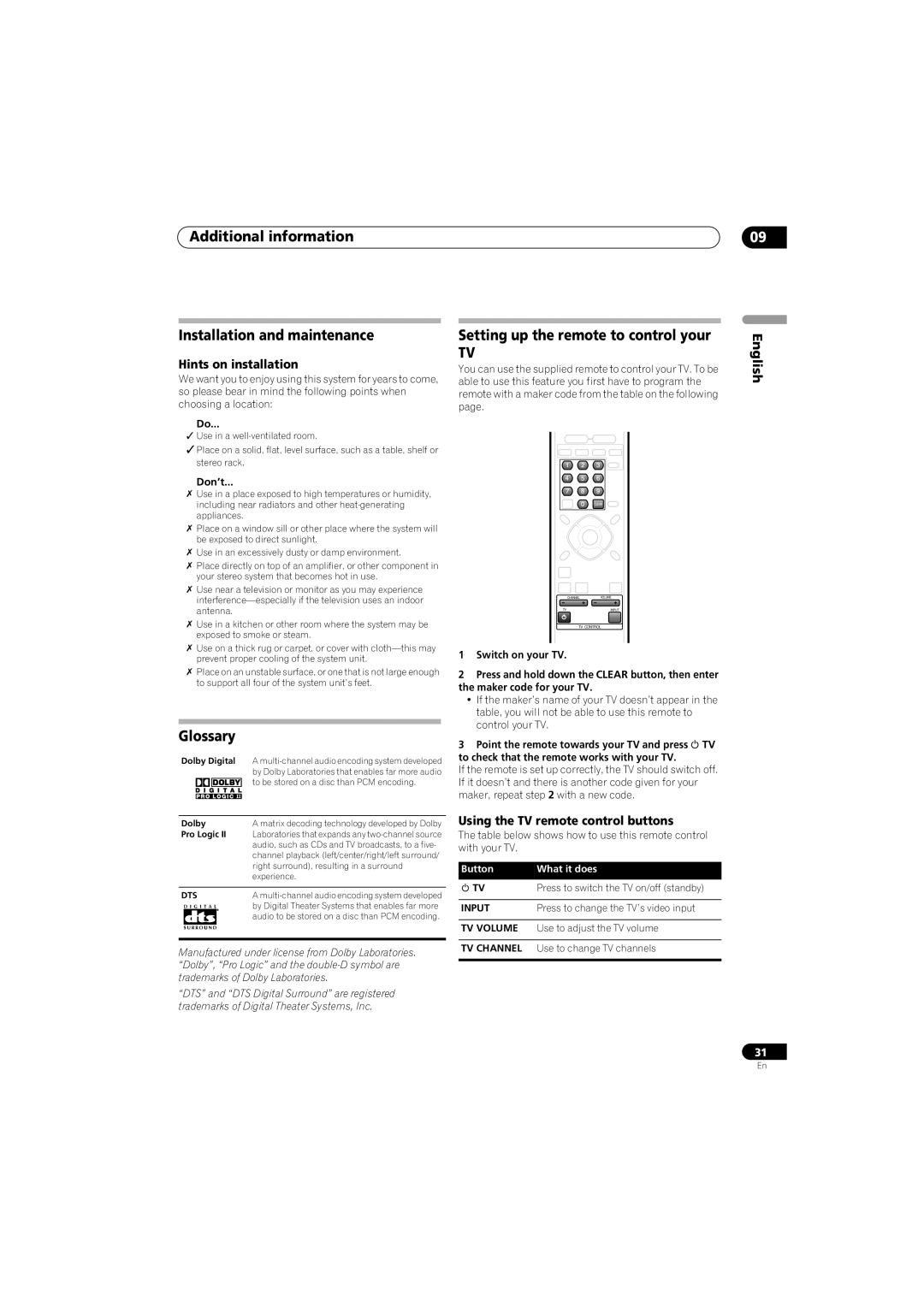
Additional information
Installation and maintenance
Hints on installation
We want you to enjoy using this system for years to come, so please bear in mind the following points when choosing a location:
Do...
Use in a
Place on a solid, flat, level surface, such as a table, shelf or stereo rack.
Don’t...
Use in a place exposed to high temperatures or humidity, including near radiators and other
Place on a window sill or other place where the system will be exposed to direct sunlight.
Use in an excessively dusty or damp environment.
Place directly on top of an amplifier, or other component in your stereo system that becomes hot in use.
Use near a television or monitor as you may experience
Use in a kitchen or other room where the system may be exposed to smoke or steam.
Use on a thick rug or carpet, or cover with
Place on an unstable surface, or one that is not large enough to support all four of the system unit’s feet.
Glossary
Dolby Digital | A | ||
|
|
| by Dolby Laboratories that enables far more audio |
|
|
| to be stored on a disc than PCM encoding. |
|
|
|
|
Dolby | A matrix decoding technology developed by Dolby | ||
Pro Logic II | Laboratories that expands any | ||
|
|
| audio, such as CDs and TV broadcasts, to a five- |
|
|
| channel playback (left/center/right/left surround/ |
|
|
| right surround), resulting in a surround |
|
|
| experience. |
|
|
|
|
DTS | A | ||
|
|
| by Digital Theater Systems that enables far more |
|
|
| audio to be stored on a disc than PCM encoding. |
|
|
|
|
Manufactured under license from Dolby Laboratories. “Dolby”, “Pro Logic” and the
“DTS” and “DTS Digital Surround” are registered trademarks of Digital Theater Systems, Inc.
Setting up the remote to control your
TV
You can use the supplied remote to control your TV. To be able to use this feature you first have to program the remote with a maker code from the table on the following page.
VOLUME
DVD DTV PC/GAME AUX
|
| TUNER |
ENTER | CLEAR |
|
SETUP |
| SR |
| TUNE |
|
ST | ST |
|
| ENTER |
|
|
| TEST |
SOUND |
| TONE |
| TUNE |
|
SOUND |
|
|
RETRIEVER |
|
|
SURROUND | ADVANCED | MCACC |
CHANNELVOLUME
TVINPUT
TV CONTROL
1Switch on your TV.
2Press and hold down the CLEAR button, then enter the maker code for your TV.
•If the maker’s name of your TV doesn’t appear in the table, you will not be able to use this remote to control your TV.
3 Point the remote towards your TV and press TV to check that the remote works with your TV.
If the remote is set up correctly, the TV should switch off. If it doesn’t and there is another code given for your maker, repeat step 2 with a new code.
Using the TV remote control buttons
The table below shows how to use this remote control with your TV.
Button | What it does |
TV | Press to switch the TV on/off (standby) |
|
|
INPUT | Press to change the TV’s video input |
|
|
TV VOLUME | Use to adjust the TV volume |
|
|
TV CHANNEL | Use to change TV channels |
|
|
09
English
31
En
